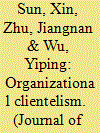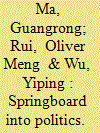| Srl | Item |
| 1 |
ID:
128940


|
|
|
|
|
| Publication |
2014.
|
| Summary/Abstract |
Extant literature on authoritarian legislatures argues that dictators set up quasi-democratic institutions to co-opt opposition and attract investors. We argue that dictators also nurture clientelistic ties with social groups useful to their rule, a previously overlooked function of authoritarian legislatures. Drawing on the case of Chinese local legislatures-namely, the local People's Congress and the local People's Political Consultative Conference-we find that Chinese local governments use these institutions to channel patronage to and gain political support from the private sector. Field interviews and an analysis of a nationwide firm-level survey show that private firms owned by local legislative members, while obtaining more bank loans, provide more support to the local government in various forms than those owned by nonmembers. This finding suggests that authoritarian legislatures, even those with weak policymaking efficacy, can help authoritarian states build stable alliances with social groups, thereby contributing to regime resilience.
|
|
|
|
|
|
|
|
|
|
|
|
|
|
|
|
| 2 |
ID:
143366


|
|
|
|
|
| Summary/Abstract |
Business associations in authoritarian regimes behave systematically different from their counterparts in democratic regimes. Using a unique dataset of Chinese private firms, this paper examines the impacts of joining the most prominent business association in China, the All-China Federation of Industry and Commerce (ACFIC) which was initiated and strongly controlled by the government. We find that ACFIC members have much higher chances to obtain formal political identities, that is, the deputy of People's Congress (PC) or the People's Political Consultative Conference (PPCC). However, ACFIC membership itself cannot help entrepreneurs acquire scarce resources that are controlled by the government. Rather, ACFIC members bear heavier tax burdens and make more informal payments to government officials. These findings suggest that the ACFIC act as a springboard into politics, rather than an effective collective action committee that can bring common benefits to its members or protect members from government predation.
|
|
|
|
|
|
|
|
|
|
|
|
|
|
|
|